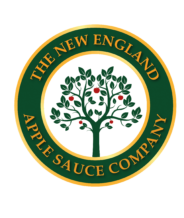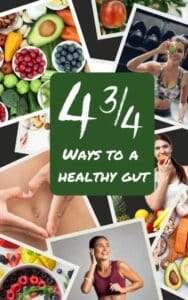
Why is organic food more expensive?
You may want to feed your family as much food that has been produced organically as possible. However, the high price of certain organic foods is putting you off.
Since this article is about the cost of organic food, we aren’t going to discuss if it is better for you! If you want to find that out have alook at our article on: Is Organic Food Better for You which will address that topic.
So, why is organic food more expensive? Quite simply, the law of supply and demand.
The demand for organic food is high in comparison with the ability to produce it. This helps to explain why is organic food more expensive.
In 2020 in the European Union the amount of land used for organic farming was 14.7 million hectares!
Does that sound like a lot to you?
It did to me.
The amount of land converted to organic continues to increase and in 2020 organic agricultural land comprised 9.1% of the total agricultural land in the EU.
Up from 5.9% in 2012.
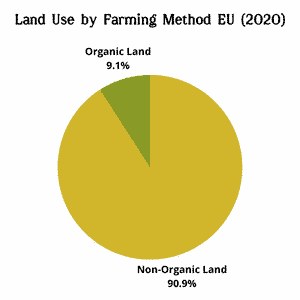
In the UK that translates to 489,000 hectare or about 2.8% of agricultural land.
As you can see a very small percentage of the total land available for farming is used organically.
The reasons why is organic food more expensive are many, but here are a few.
The first is that the standards for organic farming are pretty high. In the UK if you want to call yourself “organic” you must go through a rigorous certification process. Not only rigorous but depending on the operations also expensive.
A typical organic certification cost about £900 per year just for the cost of being certified. Most of the certification organisations are run as a not for profit organisation.
That doesn’t include the changes that need to be introduced in the processes to produce food. A farm converting to organic typically takes about three years.
Why this stringent organic process?
You are concerned about the food you and your family eat.
It’s important for you to know where your food comes from.
An organic symbol on a product isn’t just a marketing gimmick, it really means that it has been legally certified as organic.
These standards are strict and governed under EU and UK law.
Conventional farming relies heavily on pesticides and artificial fertilisers.
Not so with organic farming, successful organic farming requires vigilant planning and preparation:
- Careful crop rotations and the capture of nitrogen using clover and legumes (beans, peas and lentils) to help develop healthy soil.
- Creating field margins that contain wildflowers and keeping hedgerows healthy encourages beneficial critters to roam around the farm and helps to reduce pests, without the pesticide.
- Create a closed loop system by occasionally bringing animals onto the farm helps to produce fertiliser so nothing artificial has to be added.
This clearly illustrates why organic food is more expensive.
Other factors that determine why organic food is more expensive.
According to Dr Gavin Broad of the Natural History Museum, “In recent years there has been a huge focus on the decline of birds and mammals, but less so for insects.
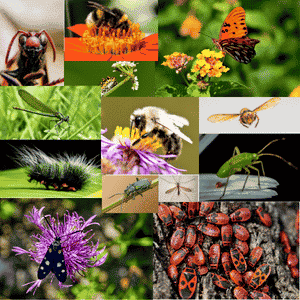
“Over 95% of all animals are invertebrates - they're the group that keep the world functioning.” “Insects are the main drivers of many of our ecosystems on land and in freshwater”
Dr Gavin Broad
With over 40% of insect species being threatened with extinction these measure can go a long way in halting the decline in insect populations.
Intensive agriculture and pesticide use is the main driver of these declines.
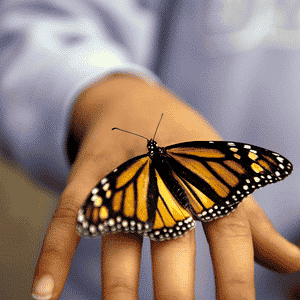
What's the answer?
According to the Soil Association:
If pesticides were substituted for more sustainable farming practices like organic, this could slow or reverse the decline in insects:
- Organic farming uses virtually no pesticides, and the small number of pesticides organic farmers are permitted to use are all based on naturally occurring substances
- As such, organic farms are havens for wildlife and provide homes for bees, birds, butterflies and bugs
- On average, birds and insects are 50% more abundant on organic farms
Instead of asking, why is organic food more expensive, perhaps you are beginning to see a bigger picture?
What is the true cost to produce that head of lettuce, apple, asparagus, egg or lamb chop?
How odd is it that it’s cheaper to have an unhealthy, unsustainable diet rather that a healthy, sustainable one.
In a report compiled by the Food and Land Use Coalition which, among many other topics, explores the hidden costs of food production in the world.
“The global food industry has an estimated market value of around $10 trillion, accounting for more than ten percent of global GDP.”
“However, current methods of production and consumption mean that what the population eats costs twice as much as the figure on the bill, because every dollar spent on food is matched by more than a dollar added to environmental, health and economic costs.”
“Unhealthy diets and harmful farming practices cost the world economy more than $6 trillion a year in lost productive life.”
“The global agricultural system emits a volume of carbon dioxide equivalent (CO2e) costing $1.45 trillion a year (assuming a social cost of carbon of $100 per tonne of CO2e), while deforestation, water scarcity and land degradation impose costs of almost $1.7 trillion from losses in output and biodiversity.”
“Millions of people remain trapped in vulnerable livelihoods that do not produce a decent return, at a cost of $0.7 trillion a year, while $1.3 trillion of resources are wasted along food supply chains.”
Taking into account the true cost of our food puts the question of why is organic food more expensive into a different perspective.
Will “going organic” solve these all these problems immediately?
Of course not.
Converting a farm to organic can be a risky business.
To try and incentivise farmers to “go organic” the UK government has recently announced plans to reward farms for employing sustainable methods of farming.
Department for Energy, Food and Rural Affairs (Defra) said it “recognises the benefits that organic farming can offer to the wider environment” and said it is exploring how to reward organic producers for their existing and long-standing nature-friendly farming methods. Have a look at the full article here.
It will take a change in our attitudes and habits when it comes to food.
We haven’t got to start wearing hemp and eating grass, however small consistent changes can have a huge impact on our health and the environment.
So, is organic food worth the money?
Perhaps you are paying a little more for some of your food but the real winners will be a sustainable system for producing food for generations to come.
